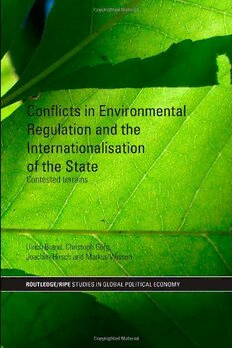
Conflicts in Global Environmental Regulation and the Internationalisation of the State Contested Terrains PDF
293 Pages·2008·1.907 MB·English
Most books are stored in the elastic cloud where traffic is expensive. For this reason, we have a limit on daily download.
Preview Conflicts in Global Environmental Regulation and the Internationalisation of the State Contested Terrains
Description:
This book examines the global regulation of biodiversity politics through the UN UNConvention on Biological Diversity (CBD), the WTO and other international treaties. Using historical-materialist state and regulation theory, it assesses how the discourse and politics of sustainable development have contributed to the internationalisation of the state. The authors argue that sustainable development, far from being a fixed concept, is a conceptual terrain on which different and conflicting symbolisations of and solutions responses to of the ecological crisis struggle for hegemony. Furthermore, it shows that the international multilateral environmental organisations agreements are not at all a means to counteract neoliberal globalisation but, on the contrary, form an integral part of the ongoing transformation process. Focussing on the UN Convention on Biological DiversityCBD, the FAO International Treaty on Plant Genetic Resources for Food and Agriculture and the Agreement on Trade-related Aspects of Intellectual Property Rights (TRIPS) in the World Trade Organisation, this co-authored volume addresses the following issues: state theory, regulation theory and International Political Economy biodiversity protection and valorisation of genetic resources access to genetic resources and sharing of benefits which arise out of its use enforcement of intellectual property rights and their impact on biodiversity. This book will be of interest to students and scholars of international politics, international political economy, environmental studies, development studies and political ecology.
See more
The list of books you might like
Most books are stored in the elastic cloud where traffic is expensive. For this reason, we have a limit on daily download.
